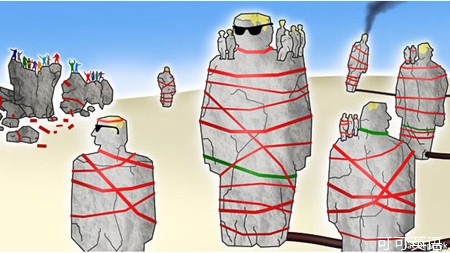Finance and Economics;Free exchange;Arab spring cleaning; Why trade reform matters in the Middle East;
A year after the start of the Arab spring, no government in the Middle East has attempted serious economic reform even though it is obvious both that economies are distorted and that discontent over living standards has played a big part in the uprisings. The main reaction by governments has been to buy off further protests by increasing public spending. Saudi Arabia boosted government spending by over 50% between 2008 and 2011.
阿拉伯之春爆發(fā)已有一年。雖然很明顯當(dāng)前經(jīng)濟(jì)發(fā)展畸形,且當(dāng)年對生活水平的不滿正是革命爆發(fā)的主因之一,但至今,中東各國政府都沒有嘗試過任何認(rèn)真的經(jīng)濟(jì)改革。面對現(xiàn)狀,他們主要通過增加公共支出來收買人心、防止更多的抗議活動。2011年沙特政府支出比2008年增長了50%。

Although higher oil prices have been enough to finance these rises, much of the extra spending has gone into public-sector wages and consumer subsidies. Food and fuel subsidies are often huge: over 10% of GDP in Egypt. In the region as a whole, fuel subsidies rose from 2.3% of GDP in 2009 to 3.2% in 2011.
固然,油價(jià)的漲幅足以保障這部分支出的增長,但很大程度上這筆錢是用在公職人員加薪和消費(fèi)者補(bǔ)貼上的。食品和燃油補(bǔ)貼數(shù)額巨大:在埃及,這一數(shù)字超過了GDP的10%;在整個(gè)中東地區(qū),燃油補(bǔ)貼占GDP比例從2009年的2.3%增長到了2011年的3.2%。
These subsidies benefit the rich, keep loss-making firms alive and damage the economy. According to the IMF, the richest fifth of Jordanians capture 40% of fuel-subsidy gains; the poorest fifth get 7%. More important, subsidies exacerbate the region’s most important economic problem, which, argue Adeel Malik of the Oxford Centre for Islamic Studies and Bassem Awadallah*, a former Jordanian finance minister, is “that it has been unable to develop a private sector that is independent, competitive and integrated with global markets”. By distorting domestic prices, subsidising energy-guzzling firms and increasing public-sector wages relative to private-sector ones, the past year’s actions have made it even harder to develop a flourishing private sector.
這些補(bǔ)貼肥了富裕階層,讓虧損的企業(yè)茍延殘喘,損害了經(jīng)濟(jì)的運(yùn)行。IMF稱,約旦最富有的20%群體獲得了燃油補(bǔ)貼總額中的40%,而最窮的20%群體僅拿到7%。更重要的是,補(bǔ)貼政策使本地最嚴(yán)重的經(jīng)濟(jì)惡疾進(jìn)一步惡化——牛津伊斯蘭教研究中心學(xué)者、約旦前財(cái)政部長愛迪爾·馬利克稱:“約旦從未能發(fā)展一個(gè)獨(dú)立、競爭力強(qiáng)、與全球市場接軌的私營部門。”去年,擾亂國內(nèi)價(jià)格、補(bǔ)貼高油耗公司、公職人員相對私營雇員加薪等行為使得私營部門的繁榮愈發(fā)困難。
It was hard enough before. The Middle East has strikingly few private companies, less than one-third of the number per person in eastern Europe. Everywhere the state dominates the economy. In Egypt the public sector accounts for 40% of value-added outside agriculture—an unusually large share for a middle-income country. Such private firms as do exist tend to be large and closely connected to the state. The average Middle Eastern company is ten years older than in East Asia or eastern Europe because new entrants are kept out by pervasive red tape. The authors reckon it costs roughly 20 times the average annual income to start a firm in Syria and Yemen (assuming anyone would want to), just over twice the average globally. In a few Arab countries, like Tunisia, some notorious personifications of crony capitalism have fallen foul of political change but the practice has by no means ended.
這之前已經(jīng)夠難了。中東地區(qū)的私有公司少得驚人,其人均占有公司數(shù)量不到歐洲的三分之一。政府把持了經(jīng)濟(jì)的各個(gè)領(lǐng)域。在埃及,農(nóng)業(yè)之外的產(chǎn)品附加值中,國營部門占了40%——對于中等收入國家而言,這個(gè)比例算是較大了。真正存在的私營公司也往往規(guī)模較大、與政府關(guān)系密切。中東地區(qū)公司平均壽命比東亞或東歐國家長10年,因?yàn)樾碌母偁幷弑粺o處不在的監(jiān)管繁文縟節(jié)排除在市場之外。作者稱,在中東地區(qū)創(chuàng)業(yè)(假設(shè)還有人愿意創(chuàng)業(yè)的話)所需要的家底(以年均收入衡量)是在敘利亞和也門的20倍,是全球平均值的兩倍多。在突尼斯等國,一些臭名昭著的裙帶資本主義的典型代表與政變者有矛盾,但實(shí)際操作上還是老樣子。
The weakness of the private sector is typically seen as a domestic problem with domestic solutions, notably privatisation and deregulation. Earlier attempts to strengthen private businesses by pursuing those policies were in practice half-hearted or skewed towards well-connected insiders, tainting the whole process of reform. The risk of the same outcome is a big reason why, in the aftermath of the Arab spring, risk-averse governments have shied away from further efforts to privatise or cut red tape. But, argue Messrs Malik and Awadallah, there is also a regional aspect to the private sector’s weakness—the failure to develop regional markets. Here, reform may be politically easier.
一般來說,私營部門的不振被視為國內(nèi)問題,可以靠對內(nèi)政策調(diào)整解決,如私有化、減少監(jiān)管等。事實(shí)上,之前通過這些措施來強(qiáng)化私營部門的嘗試要么三心二意,要么便宜了一些人脈廣泛的“圈內(nèi)人”,因而阻礙了整個(gè)改革的進(jìn)程。阿拉伯之春后,各國政府求穩(wěn)避險(xiǎn),不愿進(jìn)一步推進(jìn)私有化和簡化監(jiān)管的改革,很大程度上是因?yàn)榭紤]到會出現(xiàn)和之前同樣的結(jié)果。但阿迪爾稱,各國私營部門的衰弱也有一個(gè)區(qū)域性原因——未能建立區(qū)域統(tǒng)一市場。這方面的改革在政治上或許更容易些。
Arab companies are globally uncompetitive. The Middle East accounts for less than 1% of world non-fuel exports, compared with 4% from Latin America (a region with a comparable population). Turkey exports five times as much as Egypt, which has a population of similar size. Despite its favourable geographical location the Middle East is rarely part of global supply chains. And of its modest global exports, inter-Arab trade accounts for less than a tenth, barely more than in 1960.
中東地區(qū)公司全球競爭能力較弱。世界非油類出口總額中,僅有不到1%來自中東地區(qū),而人口規(guī)模類似的拉丁美洲地區(qū)占4%。土耳其人口規(guī)模與埃及類似,但出口額是埃及的5倍。盡管占據(jù)有利地理位置,中東地區(qū)在全球供應(yīng)鏈條中地位輕微。中東地區(qū)的全球貿(mào)易出口量本來就不大,而其中本區(qū)域內(nèi)的貿(mào)易僅占10%,比1960年時(shí)多了一點(diǎn)而已。
The usual explanation for the failure to trade is the region’s resource curse. Because it is so easy to export crude oil, Arab countries have failed to develop significant merchandise exports. And because so many export the same thing—oil—they naturally do not trade with each other. Even if that were the whole story, the region would still need to develop competitive manufacturing or services to cope with demographic change. Oil cannot generate the tens of millions of new jobs that predominantly young Arab countries will need. But it is not the whole story. Arab countries could trade with each other more than they do, and part of the reason that they do not is self-inflicted.
通常認(rèn)為,中東地區(qū)貿(mào)易衰微現(xiàn)象是由于其資源結(jié)構(gòu)的單一。因?yàn)槌隹谠休p而易舉,中東國家從未發(fā)展強(qiáng)大的一般商品出口。又因?yàn)檫@么多國家都出口同一產(chǎn)品——石油,他們自然不會相互買賣。就算這就是當(dāng)前局面的全部原因,中東地區(qū)仍需發(fā)展有競爭力的制造業(yè)或服務(wù)業(yè),以適應(yīng)人口變化。石油不能為大多年輕的阿拉伯國家創(chuàng)造所需的工作崗位。況且這并非問題的全貌。阿拉伯國家完全可以相互開展更多的貿(mào)易,現(xiàn)在之所以未能實(shí)現(xiàn),部分原因是人為導(dǎo)致的。
Obstacles to regional trade are legion. Costly “trade logistics”—non-tariff barriers, red tape and poor infrastructure—add 15% to the value of Egyptian clothes and 10% to the total value of all goods shipped in the region. It costs companies an average of 95 man-days a year just to deal with trade bureaucracies. It takes longer and is more expensive to ship goods between two Middle Eastern ports than to send them from the Middle East to America. Such market fragmentation, the authors argue, is the consequence of the region’s centralised, state-led economic policies.
區(qū)域貿(mào)易的阻礙太多了。“貿(mào)易物流”成本高昂——非關(guān)稅性壁壘、繁雜的貿(mào)易手續(xù)和落后的基礎(chǔ)設(shè)施——占到了埃及服裝出口價(jià)的15%,占到了中東區(qū)域內(nèi)所有商品價(jià)值的10%。如果每家公司出一個(gè)人來處理繁雜的貿(mào)易手續(xù),那么一年中僅這些工作平均就要消耗95天。在兩個(gè)中東港口間的貨運(yùn)成本要比從中東到美洲的運(yùn)價(jià)還要高。市場分割到這種程度,作者稱,是“集中化、國營主導(dǎo)的經(jīng)濟(jì)政策所導(dǎo)致”。
Just start somewhere
More trade would have familiar benefits: larger markets should enable firms to reap greater economies of scale, increase returns to investment and adopt more new technology. Just as important in the Middle Eastern context, more open trade would begin the process of dismantling over-centralised states and create a constituency for further economic change.
大家都知道貿(mào)易增長的好處:更大的市場可以讓公司更好地利用規(guī)模經(jīng)濟(jì)、增加投資回報(bào)、采用更新的技術(shù)。鑒于中東目前政治狀況,開放貿(mào)易還有一個(gè)重要功能,就是開始消除經(jīng)濟(jì)集中化,并為未來進(jìn)一步的經(jīng)濟(jì)改革爭取民意支持。
Of course, trade liberalisation is no substitute for privatisation, financial reform and other domestic measures. But it has a political advantage over those reforms. Because the steps required are relatively small ones (reductions in red tape, for instance) they should provoke less resistance from insiders; and because regional trade can be presented as a pan-Arab goal, it does not have the same taint of “Westernisation” that discredited earlier reform efforts. Regional trade would be only a start. But the main thing is to start somewhere.
當(dāng)然,貿(mào)易自由化并不能代替私有化、金融改革和其他國內(nèi)改革。但貿(mào)易自由化在政治上比其他更有優(yōu)勢,因?yàn)樗枰~出的步伐相對較小(比如,減少過度監(jiān)管),引發(fā)的內(nèi)部抵制較少,且區(qū)域貿(mào)易可以被描繪成一個(gè)有利于阿拉伯世界自身利益的目標(biāo),而不會有渾水摸魚的“西方化”(之前的改革正是因此喪失了民心)。區(qū)域貿(mào)易僅僅是一個(gè)開始,但不論從哪一處著手,盡早開始是正經(jīng)。











